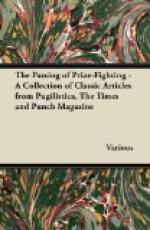And humorous “PHIZ” and spectral
READ,
Made us alternate smile and
shiver.
Ah! ghosts, Ma’am, then were ghosts
indeed,
Born of the brain and not
the liver.
You shared our LEMON and our LEECH;
Our BROOKS for you ran bright
and sunny.
May you live long, to limn and teach.
Be graphic, genial, sage,
and funny!
We like you well, we owe you much,
True record, blent with critic
strictures,
And culture of the artist touch
Through half a century of
pictures.
We wish you many gay returns
Of this May day! You’re
brighter, plumper
Than then; and Punch, who envy
spurns,
Drinks your Good Health, Ma’am,
in a bumper!
* * * * *
“ORME! SWEET ORME!”—Orme is still off solid food, and is kept alive entirely by Porter. It is the opinion of the best informed that “Porter with a head on” will pull him through. Smoking is not permitted in the stable, but there is evidence of there being several “strong backers” about.
* * * * *
[Illustration: MR. PUNCH CONGRATULATES MADAME ILLUSTRATED LONDON NEWS ON ATTAINING HER JUBILEE, AND BEING YOUNGER THAN EVER.]
* * * * *
MEMS. OF THEATRES, &C., COMMISSION.
Mr. John Hare, Lessee of the Garrick Theatre, in his evidence before the Theatres and Music Halls Committee, described himself, according to the Times Report, as having “been for about thirty years an actor, and for fifteen years a manager.” This gives him forty-five years of professional life, and saying, for example, that he commenced his career as an actor at twenty, then his own computation brings him up to sixty-five If this be so, then Mr. JOHN HARE, with his elastic step, his twinkling eye, his clear enunciation, and his energetic style, is the youngest sexagenarian to be met with on or off the stage; and it is probable that when he reaches the Gladstonian age he will be more sprightly than even the Grand One himself.
In answer to a question put by Viscount EBRINGTON, Mr. EDWARD TERRY gave it as his opinion that “if officers”—he was speaking of the army not the police—“were prouder of their uniforms, and did not take the earliest opportunity of divesting themselves of them, the uniform would be more respected.” He ought to have put it, “would be uniformly more respected.” But how about the man inside the uniform? But why should a soldier wear his uniform when off duty any more than a policeman when off duty, or any more than a barrister should wear his wig, bands, and gown, when not practising in the Courts? There is one person who should always wear a distinctive uniform, and that is a Clergyman, who is never off duty. Perhaps this is already provided for by the Act of Uniformity.




